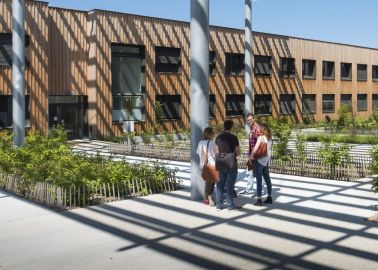Learning key concepts related to the interdisciplinary concept of the Anthropocene, identifying the stakeholders involved, assessing new decision-making responsibilities... These were the main objectives of this training course, structured around a pratical approach, case studies and scientific data.
This three-day training was led by a number of speakers who shared their expertise: Caitriona Carter, Director of Research in Political Science; Eric Macé, Professor of Sociology; Joan Cortinas Muñoz, Senior Lecturer in Sociology; Andy Smith, Director of Research in Political Science.
PhD students from ENLIGHT partner universities (University of Tartu, University of Groningen and University of Göttingen) participated in the training. It offered a unique opportunity to discuss various research topics and a multicultural approach.
"The training was an insightful opportunity to learn more about the concept of 'anthropocene as the final stage of modernity' and the real challenges of translating policies into practices."
"I found the training truly insightful. It brought together participants from diverse academic and cultural backgrounds, and everyone contributed unique perspectives to the discussions. I especially appreciated the way the course facilitated open dialogue among peers and professors. It gave us a clearer understanding of how public authorities coordinate decision-making processes in response to climate change and environmental challenges. This training not only deepened my knowledge but also encouraged me to reflect more critically on the role of science in supporting democratic and inclusive governance."
"I really appreciated the interdisciplinary nature of the training and the real-life case studies that helped us understand the complexity of decision-making in the anthropocene — all the different stakeholders, conflicting responsibilities, and practical obstacles involved. I also enjoyed meeting people from so many various backgrounds; it definitely makes decision-making more challenging but also more realistic. Besides the main topic, I got to learn unexpected things about young people in Nepal, space law, human genetics, oyster farming, and complexity of the governance in France which all added so much value to the learning experience. I’m grateful to the organisers for creating an open space for these exchanges."


